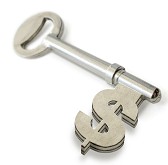Those
who trust in their riches will fall, but the righteous will thrive
like a green leaf.
-- Proverbs
11:28
The lottery has been called a tax on those who know nothing about
statistics. Indeed, the odds of winning a multi-million-dollar Powerball
drawing are about the same as being struck by lightning or giving birth to
conjoined twins.
Of course, a few lucky people really have won the lottery and the
life-changing money that accompanies it. But it turns out that many of them
weren't so lucky after all. For example, the December 28, 2017 issue of Business Insider features
the stories of 20 lottery winners who in one way or another lost everything.
William "Bud" Post won $16.2 million in the  Pennsylvania Lottery in 1988, but he was $1
million in debt within a year--and his brother even tried to have him killed.
Evelyn Adams won the lottery twice in New Jersey, but gambled away her $5.4
million windfall in Atlantic City. And in 2002, West Virginia building
contractor Andrew Jackson Whittaker, Jr., walked away with $114 million from a
multi-state Powerball drawing. Thieves stole about $750,000 in cash, he was sued
by a casino for bouncing checks--and within 4 years--his fortune had vanished.
Pennsylvania Lottery in 1988, but he was $1
million in debt within a year--and his brother even tried to have him killed.
Evelyn Adams won the lottery twice in New Jersey, but gambled away her $5.4
million windfall in Atlantic City. And in 2002, West Virginia building
contractor Andrew Jackson Whittaker, Jr., walked away with $114 million from a
multi-state Powerball drawing. Thieves stole about $750,000 in cash, he was sued
by a casino for bouncing checks--and within 4 years--his fortune had vanished.
 Pennsylvania Lottery in 1988, but he was $1
million in debt within a year--and his brother even tried to have him killed.
Evelyn Adams won the lottery twice in New Jersey, but gambled away her $5.4
million windfall in Atlantic City. And in 2002, West Virginia building
contractor Andrew Jackson Whittaker, Jr., walked away with $114 million from a
multi-state Powerball drawing. Thieves stole about $750,000 in cash, he was sued
by a casino for bouncing checks--and within 4 years--his fortune had vanished.
Pennsylvania Lottery in 1988, but he was $1
million in debt within a year--and his brother even tried to have him killed.
Evelyn Adams won the lottery twice in New Jersey, but gambled away her $5.4
million windfall in Atlantic City. And in 2002, West Virginia building
contractor Andrew Jackson Whittaker, Jr., walked away with $114 million from a
multi-state Powerball drawing. Thieves stole about $750,000 in cash, he was sued
by a casino for bouncing checks--and within 4 years--his fortune had vanished.
Even with these horror stories in mind, most people would still
rather have too much money and excess possessions than go without. And
obviously, being blessed with abundance is often a good thing. But along with
riches come hazards. The author of Proverbs
30:8 put it this way through this petition to his Maker:
"Keep
falsehood and lies far from me; give me neither poverty nor riches, but give me
only my daily bread."
Christ-followers must walk a fine line here. On one hand, having
too little might cause us to wonder if God really cares for us. But if our
stomachs and bank accounts are always full, we're the ones who can stop
depending on him! The Apostle Paul had personal experience with this issue,
which he shared through his Letter
to the Philippians:
"I
am not saying this because I am in need, for I have learned to be content
whatever the circumstances. I know what it is to be in need, and I know what it
is to have plenty. I have learned the secret of being content in any and every
situation, whether well fed or hungry, whether living in plenty or in want. I
can do all this through him who gives me strength."
Rich or poor, we can be satisfied when we share in the greatest
treasure of all--our Savior,
Jesus Christ! Likewise when we trust our Creator with our material
possessions rather than our own capabilities, we build up a lasting prize.
What's more, it's true wealth--abundance that we'll never lose through theft,
lawsuits, substance abuse--or even at the gaming tables in Atlantic City.



